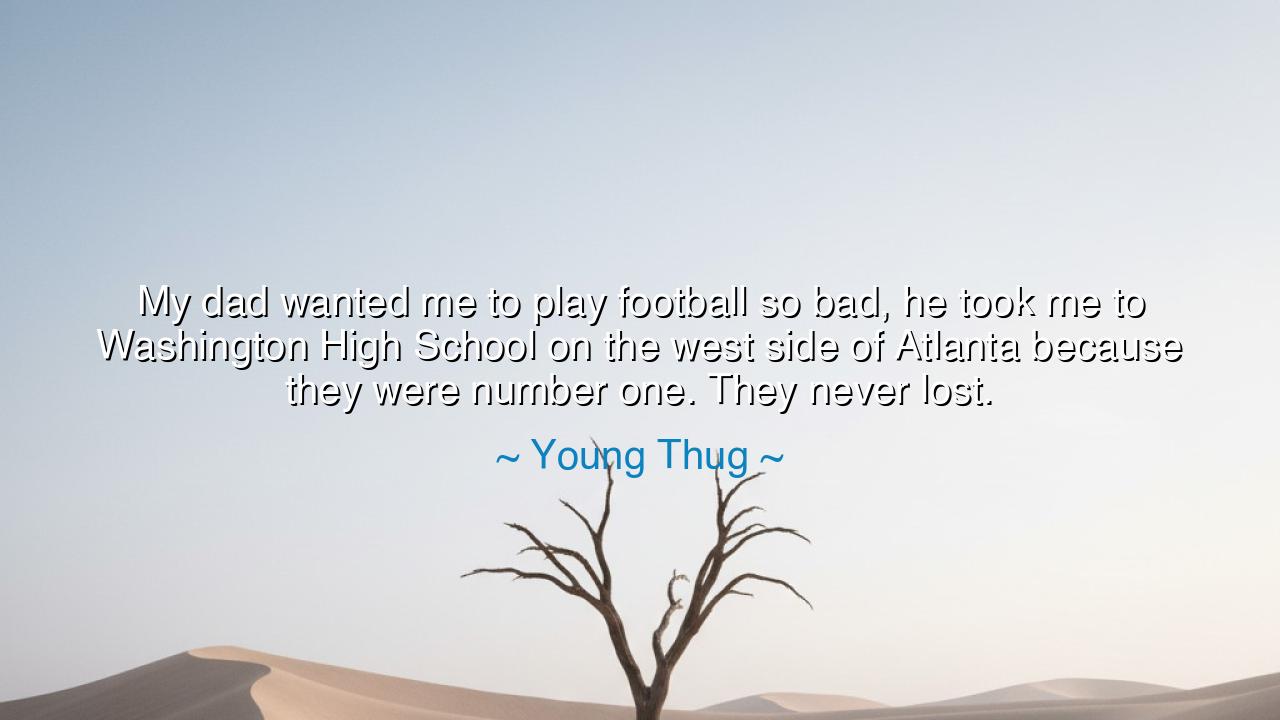
My dad wanted me to play football so bad, he took me to
My dad wanted me to play football so bad, he took me to Washington High School on the west side of Atlanta because they were number one. They never lost.






The words of Young Thug — “My dad wanted me to play football so bad, he took me to Washington High School on the west side of Atlanta because they were number one. They never lost” — reveal not only the story of a father’s dream for his son, but the deeper rhythm of heritage, aspiration, and legacy. Beneath their casual tone lies the eternal pulse of every generation: the desire of the parent to pass on strength, to forge greatness in the child. This quote, though simple in speech, reflects the ancient relationship between expectation and destiny, between what we inherit and what we must ultimately become on our own.
In these words, we hear the echo of a father’s pride and belief — that burning wish all parents carry: to see their children achieve more than they themselves could. The father saw in football a path to victory, discipline, and respect — a way to raise his son into a man who, like the undefeated team of Washington High, would “never lose.” For the father, the game was not just sport; it was a symbol of resilience, a school of life where sweat and sacrifice forged the virtues of endurance and will. He wanted his son to walk among winners, to breathe the air of champions, to inherit the courage of those who refuse defeat.
But within this tale lies another truth — that the dreams of parents, though born from love, cannot always contain the destiny of the child. The father wanted a football player, yet the son became an artist, a poet of rhythm and rebellion, one who would redefine the sound of a generation. Here we witness the eternal pattern of human growth: the seed planted by one hand must sometimes bloom in another form. Just as the oak grows from the acorn but reaches toward its own light, so too must each soul find its own path. The father’s vision gave direction, but the son’s spirit gave creation.
This story is as old as history itself. Consider Michelangelo, whose father, a minor nobleman, despised the idea of his son becoming an artist, believing art too humble a trade for their name. Yet Michelangelo’s genius could not be silenced by fear or tradition; he obeyed the inner voice that called him to sculpt beauty from stone. In time, his work immortalized his name far beyond the reach of his father’s ambition. So too does Young Thug’s story remind us that destiny is not always found where others expect it — it is found where passion, struggle, and faith converge.
And yet, one must not see the father’s dream as folly. For even when it fails to predict the future, the intention behind it remains sacred. The father who drove his son to Washington High did so not to control him, but to gift him the fire of pursuit — to teach him that greatness demands discipline and faith in oneself. Though the son would leave the football field for the stage, he carried with him the same lessons: the rhythm of effort, the will to “never lose,” the courage to face a world that doubts. Thus, what began as a dream of football became a foundation for triumph in another arena.
This is the paradox of inheritance: the form may change, but the spirit endures. Every generation must translate the hopes of its elders into new languages of expression. The father’s field was of turf and tackles; the son’s is of rhythm and rhyme. Yet both share the same battle — to create, to rise, to win against the odds. In this way, the dream lives on, not through imitation, but through transformation. What the father began in the sweat of the field, the son completes in the song of his art.
Let this, then, be the lesson passed down: honor the dreams that built you, even if your path leads elsewhere. The hopes of those before you are not chains to bind you, but torches to light your way. Take their belief in you, shape it with your own vision, and carry it further than they ever dreamed. For as Young Thug’s story teaches, greatness is not always found on the field of another’s choosing — it is found in the courage to turn inherited dreams into your own kind of victory.
Thus, the father’s wish and the son’s destiny meet not in conflict, but in harmony: both born from love, both striving for triumph. One trained the body to never fall; the other trained the spirit to never yield. And in that union of will and heart, we find the ancient truth that every generation lifts the next — not to make it the same, but to help it soar higher.






AAdministratorAdministrator
Welcome, honored guests. Please leave a comment, we will respond soon